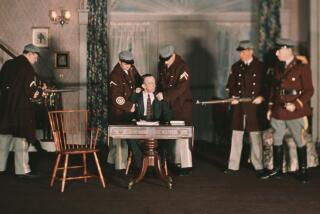In Defense of Author Heinlein
- Share via
Yes, I’m a science-fiction reader. No, not a Trekkie, I’ll pass on swords and sorcery. . . . I grew up reading the real stuff, the great speculative fiction of Asimov, Niven, Clarke and, most especially, Robert A. Heinlein. Stories that challenged the reader to think through the “what ifs” to see the future and themselves.
Therefore, I tend to be pleased to see one of my favorite author’s stories being retold in another medium to new generations who may not have read him. I can even grit my teeth and smile when his classic story of a boy growing to manhood in the military, “Starship Troopers,” is reduced by the narrow viewpoint of a film production to special effects, action sequences and gore (“Attack of the $100-Million Insects,” Calendar, Sept. 23). After all, I still like “Hamlet,” even after enduring several dreadful blood-soaked “neo-modernist” productions. Good writing can transcend barbaric productions as long as the performances are faithful to the text.
But I must protest the mocking and maligning of an author who in death cannot answer the false charges in the Calendar article. Actor Clancy Brown suggests that Heinlein advocates, glorifies, even speaks approvingly of fascism in this story. “That’s what attracted me, actually, the not-so-subtle fascist comments,” Brown is quoted as saying. And writer David Kronke observes that “Heinlein’s book actually suggested that the best societies would be run by military dictatorships.”
The facts, however, are that Heinlein’s career and writing were strongly in opposition to fascism. Heinlein spent years serving in World War II, fighting German, Italian and Japanese fascism. His writing deplored dictatorships in Russia and China during the ‘50s, ‘60s and ‘70s, and the text of “Starship Troopers” lays out a governmental scheme that is clearly a representative democracy.
Heinlein in the book does pose a governmental system where to earn the right to vote or stand for office, the citizen must volunteer for national service, a decision that might include required military service, but he says in practical terms this would be military in nature only 5% of the time. In this, Heinlein suggests something less radical than what is essentially the present law in such countries as Switzerland, Israel and France, which have compulsory military service. Heck, were Jimmy Carter and Bill Clinton being flaming fascists when they both suggested that it might be a good thing for America’s youth to involve themselves in some sort of national service?
Military dictatorship? Nonsense! Heinlein’s story suggests a society where no serving military personnel may hold political office. And since one only gets the right to vote and run for office after national service, the idea of a military dictatorship is ludicrous.
Frankly, what I expect is much more troubling to Brown and Kronke is that they think Heinlein glorifies the military. You know, that is absolutely true. Bob Heinlein, just like Bob Dole since his military service in WWII, always had a soft spot in his heart for those young men who, as Francis Scott Key put it, “stand between their loved homes and wild war’s desolation.” And neither has been afraid to talk about it.
This story glorifies the “poor bloody infantry,” as they have been called, those sorry dog-faces who have always been called in to clean up the messes of politicians by holding hostile ground in the face of the enemy. These are the boys we sent to the halls of Montezuma and the horrors of Shiloh, to Vietnam and Bosnia and a hundred other Godforsaken hells. We owe them the honor of having their story, and Heinlein’s, depicted accurately.
More to Read
Sign up for our Book Club newsletter
Get the latest news, events and more from the Los Angeles Times Book Club, and help us get L.A. reading and talking.
You may occasionally receive promotional content from the Los Angeles Times.








